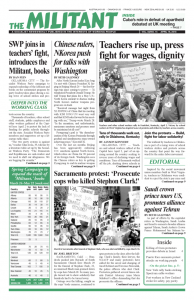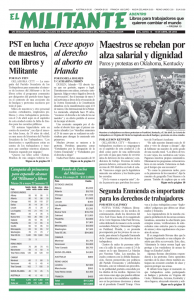As part of efforts by the capitalist rulers in Washington, Saudi Arabia and Israel to cement a broader alliance against Tehran, Saudi Arabia’s Crown Prince Mohammed bin Salman began a three-week U.S. tour March 20. He is also seeking more capitalist investment to diversify and strengthen the Saudi economy and “modernize” social relations there.
At the same time, the presidents of Russia, Turkey and Iran — Vladimir Putin, Recep Tayyip Erdogan and Hassan Rouhani — met April 4 in Ankara to discuss further collaboration in Syria. Each of these capitalist regimes is jockeying to strengthen their own interests, and have worked together on some moves in Syria — mostly give each other space to maneuver.
The Saudi monarchy recognizes that for it to become a serious force in the region — politically, economically and militarily — requires bringing the country into the 21st century.
In an interview with the Atlantic’s editor Jeffrey Goldberg, Prince Mohammed said there are two warring camps in the Middle East today. The first is what he called “the triangle of evil” — the Shiite clerical regime in Iran, the Muslim Brotherhood, and Sunni terrorist groups like Islamic State and al-Qaeda.
Along with Washington, he includes in his camp the governments of Bahrain, Egypt, Jordan, Kuwait, Oman, United Arab Emirates and Yemen. Without saying it in so many words, he sees the Israeli regime as a crucial ally.
When asked by Goldberg if he believed the Jewish people have a right to a nation-state, he replied, “I believe the Palestinians and the Israelis have the right to have their own land. But we have to have a peace agreement to assure the stability for everyone and to have normal relations.”
The Saudi government, like its Arab government allies, does not have formal diplomatic relations with the Israeli regime, but has growing collaboration on intelligence matters and other connections.
“There are a lot of interests we share with Israel,” Prince Mohammed said, “and if there is peace, there would be a lot of interest between Israel and the Gulf Cooperation Council countries and countries like Egypt and Jordan.”
Besides meeting with President Donald Trump, cabinet members and Democratic and Republican Party politicians, the Saudi prince is meeting with corporate executives in Boston, New York, California and Texas. He is also meeting with movie producers and others in Hollywood, as the Saudi regime prepares to reopen movie theaters for the first time in decades.
Prince Mohammed has been in the forefront of efforts to limit the power of the Wahhabi clerical police and open up social relations. Women will be permitted to drive in June, and are now allowed to attend sporting and other public events.
“We’re knocking the hell out of ISIS [Islamic State]. We’ll be coming out of Syria, like very soon,” President Trump said in Ohio March 29, while the Saudi ruler was still in the U.S. “Let other people take care of it.” He has reportedly put on hold $200 million allocated for reconstruction in Syria.
Much of the liberal press went ballistic. The Washington Post ran an editorial March 31 headlined, “Trump Says We’re Leaving Syria ‘Like, Very Soon.’ Bad Idea.” Politico charged Trump with abandoning “the larger battle of influence underway among multiple nations, including Russia and Iran.”
But the liberals, who view all politics through the prism of trying to drive Trump from office, miss the point. Trump wants U.S. allies to shoulder more of the cost. Reuters noted that at an April 3 press conference Trump said the U.S. government won’t “rest until ISIS is gone” and set no timetable for a troop withdrawal.
Trump noted that Saudi Arabia wants the 2,000 plus U.S. troops to remain in Syria. “Well you know, you want us to stay,” Trump said. “Maybe you’re going to have to pay.”
The president told national security officials, the Post reported April 4, that “he expects other countries, especially wealthy Arab states in the region, to pick up the task of paying for reconstruction of stabilized areas [in Syria], including sending their own troops, if necessary.”
Speaking at the misnamed U.S. Institute of Peace the same day, Gen. Joseph Votel, head of the U.S. Central Command in the Mideast, said, “A lot of good military progress has been made over the last couple of years, but the hard part, I think, is in front of us.” As the war with Islamic State winds down, he said, “the situation continues to become more and more complex.” The task, he said, is to move forward “without ceding power to Russia and Iran, and resolving U.S. difficulties with neighboring Turkey.”
Turkish rulers threaten Manbij
The Turkish military has invaded Syria alongside Syrian forces under its command in an offensive against Kurdish forces in the northwestern Afrin canton.
In the last few weeks the Pentagon has sent some 300 additional troops to Manbij, which Erdogan has threatened to attack next. The Kurdish-led Syrian Democratic Forces drove Islamic State out of Manbij in 2016 and has been the main ground force Washington has relied on in the battle against Islamic State.
U.S. forces have built emplacements and begun patrols both west and north of Manbij, in areas where Turkish-led forces from either Afrin or Turkey itself would mount an attack. Kurdish representatives met with French President Emmanuel Macron in Paris March 29, where he said French troops would “bolster” U.S. efforts in Manbij.

